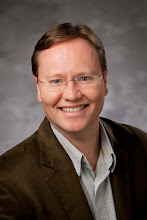More today on the remake of The Prisoner, which will star James Caviezel (Passion of the Christ) and Sir Ian McKellen (Lord of the Rings), and will be broadcast on ITV in six hour-long episodes in 2009. The news is covered widely, including here in The Guardian:
Ian McKellen to lead in ITV's The Prisoner remake
Ben Dowell
TV today said the remake, which has been written by Bill Gallagher, "will reflect 21st century concerns and anxieties, such as liberty, security and surveillance, yet also showcase the same key elements of paranoia, tense action and socio-political commentary seen in McGoohan's enigmatic original".It's great that the new version will be on ITV, like the original, in prime time, free to view for all. The new series was earlier set to go to Sky where it would only have received a fraction of the ITV audience.
Gallagher, who scripted BBC1's Lark Rise to Candleford, said: "I was haunted by The Prisoner when I saw it as a boy on its first broadcast. Here was something that was more than television, something I couldn't quite grasp but couldn't let go of. It's a unique opportunity for a writer to be able to go back to The Village and tell some new stories about that strange place and its surreal menace.
"We have a terrific cast and a wonderful director, so we hope to serve up something as beguiling and disturbing as the original was."
I first saw the news today on SFX, where I was of course keeping an eye open for the latest on Doctor Who. We are still absolutely buzzing in our house from The Stolen Earth on Saturday, which we re-watched last night. What a fantastic episode. Still, more on that anon. Back to The Prisoner news, it was also up on The Prisoner Online pretty speedily, and The Unmutual link to the full press release at The Futon Critic.
Several quick comments. The team looks excellent and inspires some confidence. I rate Caviezel highly, and McKellen is of course brilliant. But the casting of each raises questions. Is Caviezel going to be an American secret agent? If so, that will be a serious difference from the original, and not entirely welcome. Imagine if one remade Doctor Who with an American as the doctor, or imagine rebooting the James Bond franchise and making him American. McGoohan himself is Irish, and the series was British through-and-through, from the shots of Big Ben, the house of commons and the Mall through to all the actors playing Number 2. In a re-imagination, there are of course certain things that will change, but the London-based beginning, and the returns to London throughout ("Chimes of Big Ben", "Many Happy Returns", "Do Not Forsake Me" and "Fall Out") -- these are some of the basics that give it its charm.
I commented previously (More on The Prisoner Remake) on the apparent departure from the original in having a constant Number 2 present. In the original, we had a different guest star playing Number 2 each week, sometimes even in the same episode, and again this was one of those things that made it so fascinating. So while the casting of McKellen is welcome, I am a little disappointed that we won't have "the new Number 2" appearing each week.
And, of course, what about Portmeirion? It seems certain that they are not going to film there, the original filming location in 1966-7, and one of my favourite places in the world. I think that that was probably inevitable -- it is difficult to know quite how you could shoot in Portmeirion in 2008 and make it work (though I'd love to see them try). But I hope that they have found some location that at least attempts to echo some of the magic of the original.
TV remakes and re-imaginations have had mixed success. The Bionic Woman was promising but was not given enough time. Battlestar Galactica is pretty good, if a bit too intense. Doctor Who is the example par excellence of how to do it brilliantly, even to improve on the original while remaining faithful to its basics and its spirit. So much of that is down to one man, Russell T. Davies. If there is anything to learn about how to re-imagine a classic series, he is surely the man to talk to.
